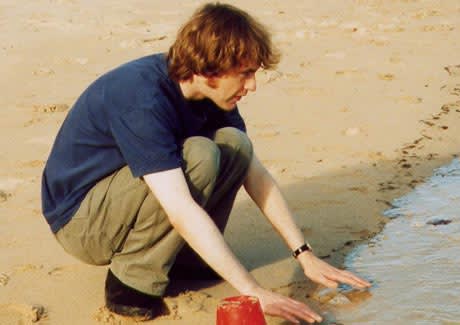Hardly any modern day singer-songwriter can strike the chord of life and set its sounds reeling out into the infinite seas of vibration as humbly, honestly and reverently as Richard Youngs does with his prayerful, almost traditional spiritual meditations. Indeed, Robert Wyatt and Ben Chasny come to mind when listening to the warbling multi-layered digital drone cycles turning into and out of themselves throughout The Naïve Shaman, but such comparisons can hardly be used to pigeonhole him since Youngs is a diverse sound-poet whose every album dwells within a different pasture from the rest. The omniscient Altar of Drone before which he perpetually kneels in worship is always present, whether Youngs is in the mood for offering transcendent introspections of electric guitar drone, minimal acoustic dialogues of peaceful dispersal or poetic a cappella splendour. The Naïve Shaman, his seventh album for Jagjaguwar, employs computer technology to bring all of Youngs talents and interests together into one beautiful, sun-spun river of sparkling drone that rolls along beneath his peaceful vocal phrases like clear rapids running below outreaching tree branches. This is a definitive and wondrously accessible effort from a long-running talent who deserves his due as an innovator.
What provoked you to take such a deep foray into digitally constructed sound? Ive been recording with a computer for a few years now. Mostly, I use it like a glorified tape machine. I guess over time Ive learnt how to mess digitally with sound and this struck me as an exciting thing to do.
The Naive Shaman seems very concerned with vibration and possesses a feeling of humble worship. What sort of feeling were you intent on emulating, if any? None, really. Im not sure I had much intent. I just make music how I feel, without much thought, and what happens is pretty much beyond my control.
What aspects of ancient culture interest you the most? Probably how people lived off the land, and they used everything at hand, close-by. Weve lost that. Everywhere is becoming increasingly like anywhere else. Before easy transport and industrialised food production, produce had by necessity to be local and seasonal. Right now, were at the tail end of the Scottish raspberry season. Give it a month, and therell be raspberries air-freighted to the shops from abroad. In ancient times, there was a link to the seasons and to the land around us. We were closer to nature.
(Jagjaguwar)What provoked you to take such a deep foray into digitally constructed sound? Ive been recording with a computer for a few years now. Mostly, I use it like a glorified tape machine. I guess over time Ive learnt how to mess digitally with sound and this struck me as an exciting thing to do.
The Naive Shaman seems very concerned with vibration and possesses a feeling of humble worship. What sort of feeling were you intent on emulating, if any? None, really. Im not sure I had much intent. I just make music how I feel, without much thought, and what happens is pretty much beyond my control.
What aspects of ancient culture interest you the most? Probably how people lived off the land, and they used everything at hand, close-by. Weve lost that. Everywhere is becoming increasingly like anywhere else. Before easy transport and industrialised food production, produce had by necessity to be local and seasonal. Right now, were at the tail end of the Scottish raspberry season. Give it a month, and therell be raspberries air-freighted to the shops from abroad. In ancient times, there was a link to the seasons and to the land around us. We were closer to nature.




